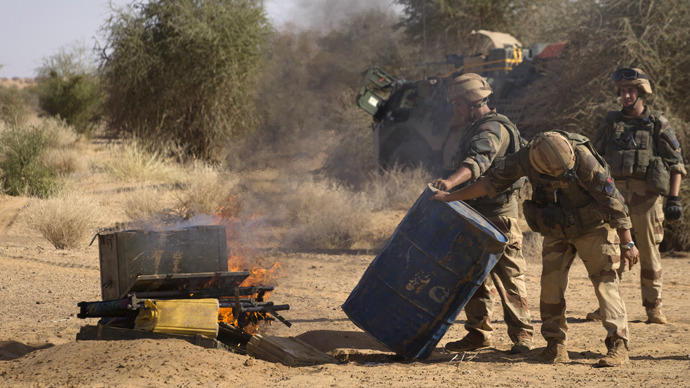‘France, US want to keep Africa under the colonial rule’

France’s decision to keep a permanent presence in Mali is the continuation of their neo-colonial policies and in this sense they are no different from the US, investigative journalist Michel Collon told RT.
He has written extensively about war strategies and media
coverage of military conflicts, and believes that both countries
regard the continent as a mere supplier of raw
materials.
RT:France now says it’s going to keep a permanent presence in Mali - is this the solution?
Michel Collon: Well, first of all, this is not the solution because it doesn’t solve the problem of Mali. The country is poor, which gives possibilities for terrorism. And if Mali is poor it’s because of plundering by French companies. So it’s not a solution, but the real goal of a French presence is not to combat the Islamists. The real goal is about the resources.
RT:So what are the options to regain stability in the region?
MC: If you want to have stability in the region, first we have to get rid of French interventionism, US interventionism also. You have to ask why they are in this region. You have to consider that Africa has about 40 percent of all minerals crucial for the economic growth of many countries, especially China, Brazil, India and so on. And you have to consider that France and the US are very active in the region installing military bases and trying to use local armies in Somalia, Congo and all the areas. Then you have to consider the French are trying to keep the privilege of their companies. They don’t want that money to be autonomous and decide what will be done with the resources. You have to consider why Mali is so poor and also Niger, which is rich with uranium. They are poor because of this sort of neo-colonialism of the West. We have to compare it with the growth in Venezuela and Bolivia, where raw materials are used to end poverty. So it is a fight against Africa, against the possibility of an autonomous Africa.
RT:Why does France seem to be selective in who it helps in Africa? It refused to step in and counter rebels in the Central African Republic. Why's that?
MC: France is supporting every political force that can be used as puppets and that is the only goal. You have the stability in Ivory Coast and then France and the US make an intervention to plunge the country into chaos. Actually one cannot understand the strategy of France or the US without understanding that they want to control Mali, Niger and the countries like Algeria, that they want to prevent the formation of unity in Africa, that they want to prevent the formation of alliance between the BRICS countries and the African economies. They are actually willing to keep Africa under the colonial rule.
RT:There are also mixed messages from the West - who support Syria's rebels - but are now looking to fight similar factions in Mali. Why the inconsistency?
MC: Yes, it’s completely hypocritical that you arm, support and finance terrorists in Libya, Syria or in the Caucasus and at the same time you pretend to fight against them in other countries. It’s completely hypocritical like it was in Afghanistan. Actually it’s a strategy initiated by [Zbigniew] Brzezinski, when you use Islamists forces with very reactionary program as a weapon to combat real enemies – Russia, China and local forces.
The statements, views and opinions expressed in this column are solely those of the author and do not necessarily represent those of RT.












